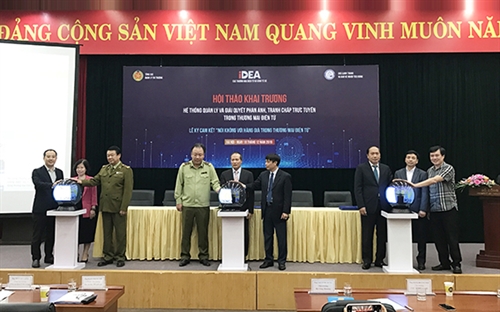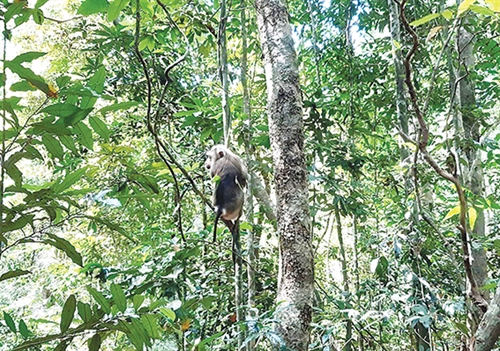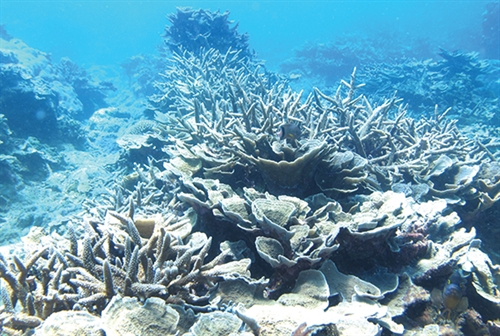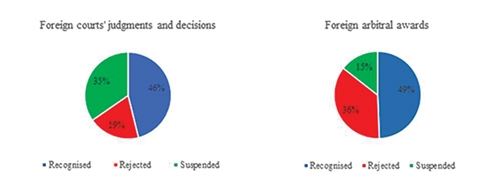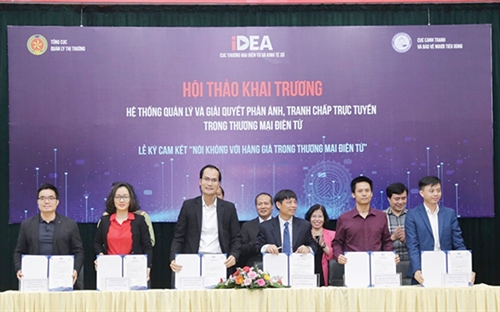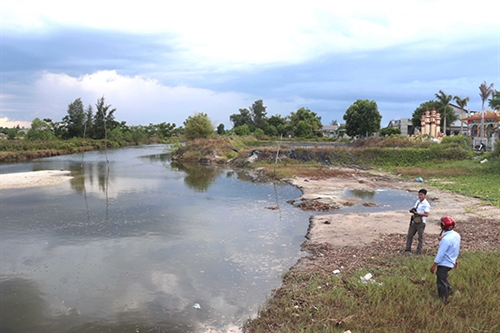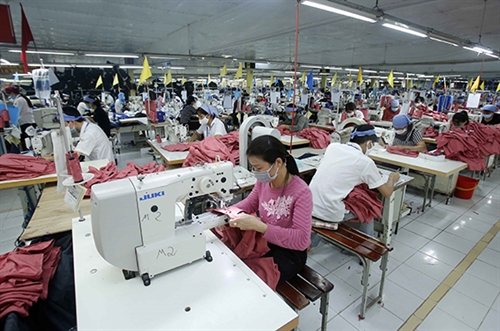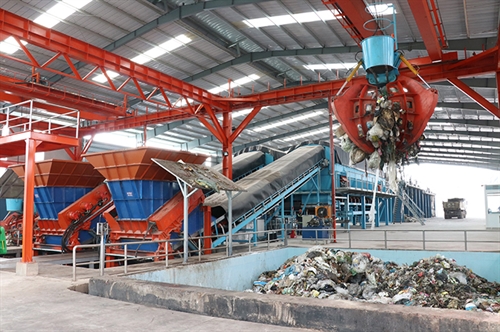Dr. Nguyen Tuan Khanh
Inspectorate Strategy and Science Institute, Government Inspectorate of Vietnam
Publicity and transparency in organization and operation of agencies, organizations and units constitute one of the most important anti-corruption measures to help citizens as well as the whole society participate in monitoring the exercise of public power. Through such publicity and transparency, citizens and the society can identify and actively exercise their rights and perform their obligations as well as request state agencies and state officials and employees to implement regulations related to publicity and transparency. Thereby, the contingent of cadres, civil servants, public employees and those holding positions and powers will be more aware in performing their duties and powers in accordance with law.
Regulations on publicity and transparency in organization and operation of agencies, organizations and units in preventing and combating corruption
Forms and contents of publicity
Ensuring publicity and transparency is a general principle regulating the organization and operation of agencies, organizations and units to prevent any excuse for not publicizing their activities, except contents classified as state secrets, to avoid the control by the people and society. Article 11.1 of the 2018 Anti-Corruption Law (the Anti-Corruption Law) specifies eight forms of publicity, including: (1) publicizing information at meetings of agencies, organizations or units; (2) displaying information at working offices of agencies, organizations or units; (3) sending written notices to concerned agencies, organizations, units or individuals; (4) distributing printed publications; (5) Notifying information in the mass media; (6) posting information on portals or websites; (8) Holding press conferences; and (8) providing information at the request of agencies, organizations, units or individuals.
Meanwhile, Article 13 of the Anti-Corruption Law clearly regulates organization of press conferences, making of statements and provision of information to the press. Accordingly, agencies, organizations and units will hold press conferences, make statements and provide information to the press on a periodical or unscheduled basis regarding their organization and operation as well as their anti-corruption activities and actions against corruption cases in accordance with the press law, unless otherwise prescribed by the press law.
Contents subject to publicity and transparency are specified in Article 10.1 of the Anti-Corruption Law, including: (i) implementation of policies and laws related to the lawful rights and interests of officials, civil servants and public employees; workers; officers and military personnel in the armed forces, and citizens; (ii) distribution, management and use of public funds, public assets or funds raised from other lawful sources; (iii) human resources management of agencies, organizations and units; code of conduct for office holders; and (iv) implementation of policies and laws other than those mentioned above which are required by law to be disclosed.
In addition, agencies, organizations or units that have influence over other agencies, organizations, units and individuals have to disclose information about administrative procedures.
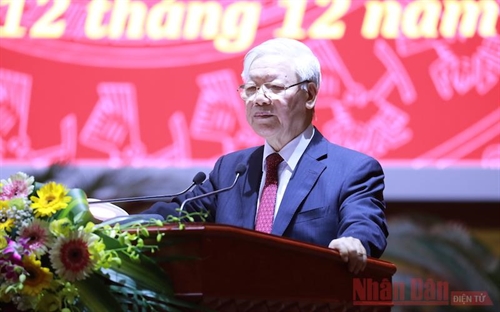 |
| Party General Secretary and State President Nguyen Phu Trong speaks at a national conference to review the anti-corruption work for 2013-2020__Photo: Internet |
Right of access to information
Article 25 of the 2013 Constitution stipulates that citizens have the “right of access to information". Many Party documents also mention the requirement of "guaranteeing the right to information" of citizens,[1] especially in the field of corruption prevention and combat”. On April 6, 2016, the XIIIth National Assembly at its 11th session passed the Law on Access to Information (effective on July 1, 2018), which regulates the exercise of citizens’ right of access to information, principles, order and procedures for exercising this right, as well as responsibilities and obligations of state authorities in this right.
The Anti-Corruption Law specifies the right to request provision of information as follows: State authorities, political organizations, socio-political organizations and press agencies may, within the ambit of their duties and powers, request agencies, organizations and units to provide information about the latter’s organization and operation in accordance with law. Within 10 days after receiving a request, the requested agency, organization or unit will provide information, except information details already published in the mass media, printed in publications or publicly displayed; otherwise, it has to send a written explanation to the requester.
Meanwhile, citizens are entitled to request state authorities to provide information in accordance with the law on access to information.
The provision of information by agencies, organizations and units for their cadres, civil servants, public employees, workers, officers and servicemen in the armed forces must comply with the regulations on exercise of grassroots democracy and relevant regulations.
To ensure the right to request provision of information, Government Decree 59/2019/ND-CP dated July 1, 2019, detailing a number of articles of and providing measures to implement the Anti-Corruption Law (Decree 59), dedicates one chapter (Chapter VIII) on provision of information at the request of agencies and organizations, which specifies the rights and obligations of requesters for provision of information; rights, obligations and responsibilities of heads of the agencies, organizations and units requested to provide information; and forms of and response to requests for provision of information.
Accountability
In Vietnam, the term "accountability" has just become popular in the past few years, particularly in discussions on publicity and transparency in the operation of agencies, organizations and units. While "responsibility" describes a certain job and person in charge of such job, accountability has a broader sense, associated with publicity and transparency in public duties and considered an important instrument to prevent corruption. Accountability covers the responsibility of the stakeholders not only to disclose required information but also to interpret and clarify such information.
Accountability is stated in Article 15 of the Anti-Corruption Law as follows: Agencies, organizations, units and individuals are accountable for their decisions and acts in performing their assigned duties at the request of agencies, organizations, units or individuals directly affected by such decisions or acts. The accountability rests with heads of organizations or persons lawfully authorized to carry out such duty.
In case the press publishes information about violations and requires feedback on issues related to the performance of public duties, the competent agency, organization, unit or individual must give explanations and publicize them in the press in accordance with law.
The provision of explanations at the request of supervisory authorities or other competent agencies, organizations, units and individuals must comply with relevant laws.
Decree 59 also dedicates one chapter (Chapter II) with 12 articles arranged in three sections to provide the contents and conditions for receiving explanation requests; cases of refusal of explanation requests, contents not subject to explanation, and responsibilities of heads of authorities in providing explanations; rights and obligations of persons who request explanation and who provide explanations; and order and procedures for providing explanations.
Recommendations on publicity and transparency in the fight against corruption in wildlife management and protection
The responsibility of wildlife protection and management in Vietnam involves various agencies, organizations and units under the Ministry of Agriculture and Rural Development (forest rangers), Ministry of National Defense (border guards), Ministry of Public Security (investigation agencies), Ministry of Industry and Trade (market surveillance forces), and Ministry of Finance (customs), etc. Therefore, the implementation of publicity and transparency measures to fight corruption in wildlife trafficking should firstly focus on the organizations and units in these agencies upon performance of their assigned duties on wildlife protection and management.
To enhance the responsibility of state authorities in applying measures to control and conserve endangered, precious and rare wild animals, the Prime Minister in February 2014 issued Directive 03/CT-TTg on strengthening the direction and implementation of measures for control and conservation of endangered, precious and rare wild animals. He asks ministries, sectors and provincial-level People's Committees to synchronously take nine measures to prevent violations of domestic and international laws relating to endangered, precious and rare wild animals. Later, on September 17, 2016, the Government leader issued Directive 28/CT-TTg on urgent solutions to prevent and combat illegal abuse of wild animals, requiring ministries, sectors and provincial-level People's Committees to strictly implement Directive 03/CT-TTg.
Directive 28 focuses on a number of key measures, defining the responsibility of competent agencies in publicity of the handling of violations. Accordingly, provincial-level People’s Committees will direct local agencies and units to review, inspect, and strictly handle the illegal trafficking of ivory and rhino horns. Inspections should aim at craft villages, processing facilities, souvenir shops at tourist spots, airports or seaports, or stores selling and preparing traditional medicines, etc. Information about the handling of violations should be published in the mass media. Heads of local Party Committees and administrations shall be held responsible before the Prime Minister for the infractions occurring in geographical areas under their management.
Meanwhile, competent agencies in charge of investigating, prosecuting, adjudicating, and handling administrative violations should focus on scrutinizing violations relating to illegal export, import, transportation, trafficking, processing, storage, advertising and use of wild animals and plants, especially ivory, rhino horns and tiger specimens. They should expedite the settlement of violations under the current law and publicize the results of settlement.
The Ministry of Agriculture and Rural Development is tasked with directing the CITES Management Authority to advise the interdisciplinary Steering Committee on control of wildlife trafficking to strengthen cooperation in sharing of information, investigation, seizure, and handling of perpetrating acts against endangered, precious and rare wild animals, particularly ivory and rhino horns; cooperate with the Ministry of Information and Communications in disseminating the regulations on protection of endangered and rare animals and plants to the public. The Vietnam Television, the Voice of Vietnam and other mass media agencies should enhance broadcasts of good practices in conserving wild animals and controlling wildlife trafficking; expose and criticize breaches of Vietnam’s law and the Convention on International Trade in Endangered Species of Wild Fauna and Flora; actively take part in law dissemination and education; and propose state management solutions to competent authorities.
In the near future, based on their assigned functions and tasks, agencies, organizations and units should continue to focus on publicity of their activities and draw the participation of the entire society in preventing and fighting wildlife trafficking and combating corruption related to wildlife trafficking.
Firstly, Forest Protection, Fisheries, Customs, Public Security, Border Guard, Tax, Market Surveillance, Animal Health, Animal Quarantine, and Environmental Protection agencies should promote administrative reform, targeting at publicizing and guiding administrative procedures, simplifying and reducing complicated procedures that require direct contact with agencies, organizations, units and individuals. For instance, procedures for applying for a CITES permit to import specimens of endangered wild fauna and flora species listed in the CITES Appendices under Government Decree 06/2019/ND-CP should be publicized in various forms (in addition to the form of publicity on the national database on administrative procedures or website of the Vietnam Administration of Forestry, etc.) with interpretation of information to facilitate fast and convenient access by businesses in need.
Secondly, it is necessary to publicize the list of wildlife animals and endangered, precious and rare forest animals; regimes toward and responsibilities of stakeholders in wildlife management and protection; procedures for exploitation of endangered, precious and rare wild animals and forest animals; the list of establishments breeding wild animals and the quantity and origin of wild animals of breeding establishments. To do this, it is required to intensify the responsibility for managing facilities breeding endangered, precious and rare forest animals and endangered wild animals listed in the CITES Appendices, especially responsibility of Forest Protection agencies at all levels in the management and inspection of breeding facilities in association with publicity of administrative procedures.
Thirdly, competent authorities should apply open and transparent inspection of wild animal raising, exploitation, transportation and trafficking. Particularly, Forest Protection, Fisheries, Customs, Public Security, Border Guard, Tax, Market Surveillance, Animal Health, Animal Quarantine, Environmental Protection, and Biodiversity Conservation forces should enhance inspection, scrutiny, and handling of violations concerning management of export, import, re-export, and transit of endangered, precious and rare forest animals and endangered wild animal species in accordance with law.
Results of the handling of violations with criminal, administrative or disciplinary measures should be made public to propagandize and educate about wildlife protection awareness while ensuring deterrence for violators.
Fourthly, agencies, organizations and units competent to perform the state management of wild animal protection should furnish equipment, build capacity, promote innovation, and apply science and technology in their organization and operation; set up hotlines for promptly receiving and processing information about wildlife trafficking, then promptly handle acts of illegally raising, transportation and storage of wild animals, acts of corruption and other violations such as taking bribes or patronage toward illegal wildlife trafficking.
Fifthly, inspection and supervision of the performance of public duties should be strengthened in parallel with improving the quality of cadres, civil servants and public employees in wild animal management and protection authorities. This is a matter of particular importance to maintain the integrity of civil servants in performing public duties, thus ensuring neutrality, publicity, transparency, and accountability in their performance.
Last but not least, it is a need to mobilize the public participation in supervising and detecting illegal wildlife trafficking and corruption acts concerning illegal wildlife trafficking, while bringing into play the role of state agencies, associations and the media in reporting on violations.-
